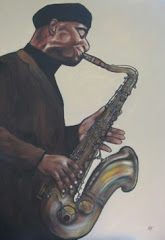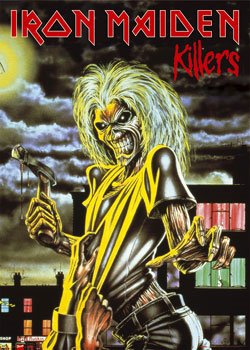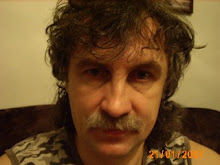
Former Yardbirds members Paul Samwell-Smith, Keith Relf, and Jim McCarty organised a new group devoted to experimentation between rock, folk, and classical forms. This quintet (Relf on guitar & vocals, McCarty on drums, plus bassist Louis Cennamo, pianist John Hawken, and Relf's sister Jane Relf as an additional vocalist) released a pair of albums on Elektra (US) and Island (UK), the first one being produced by Samwell-Smith, but dissolved quickly, leaving McCarty to reform the band into a very different lineup, though McCarty also soon departed.
The reconstituted lineup that was eventually settled on was the best-known of the band's history, and consisted of Annie Haslam (vocals), Michael Dunford (acoustic guitar), John Tout (piano), Jon Camp (bass/vocals) and Terence Sullivan (drums). This new Renaissance -- with Dunford in a composer-only role for the time being, and Rob Hendry (electric guitar) filling the guitarist's chair -- released Prologue in 1972 on Sovereign Records (UK). The music was written by Dunford and McCarty, with lyrics by poet Betty Thatcher. Hendry departed (to be ultimately replaced by Dunford) as the group turned away from the electric guitar in their music.
In the 1970s, Renaissance had a successful career, their sound similar in many ways to folk rock with classical overtones. Renaissance included in their songs quotations and allusions from such composers as Bach, Chopin, Albinoni, Debussy, Rachmaninoff, Rimsky-Korsakov, Prokofiev and others. Renaissance's records, especially Ashes Are Burning, were frequently played on American progressive rock radio stations, such as WNEW-FM, WHFS-FM, WMMR-FM, KSHE 95 and WVBR. Although commercial success was limited during this period, the band did obtain a sizable cult audience in the northeast Untied States during the mid 1970's concentrated heavily in the Philadelphia to Boston corridor.
Renaissance scored a hit single in England 1978 with Northern Lights, which reached #10 there during the summer of 1978. The single was taken from the album A Song for All Seasons, but the band floundered following 1979's Azure D'or, as fans were unhappy with the band's turn towards synthesizers, a path followed by most progressive rock bands at one time or another. Camp had assumed more of the band's songwriting, and Tout and Sullivan left. Haslam, Dunford and Camp released a pair of albums in the 1980s and then broke up. Their albums were not available on CD for some time, though a pair of compilations were issued in 1990. During the 1990s and the current decade, though, much of their catalog has been re-released by reissue record labels such as Repertoire Records (Germany), Wounded Bird Records (US) and the now-defunct HTD Records (UK).
In the late 1990s, both Haslam and Dunford formed their own bands using the name Renaissance, and have released albums with different line-ups.
The band reformed in 2000 to record the Tuscany album and played one concert at the Astoria in London before embarking on a short Japanese tour. Haslam subsequently announced that the reunion would not be continuing, and Terry Sullivan later recorded an album in the Renaissance style with lyrics by Betty Thatcher Newsinger and keyboard contributions by John Tout.
In 2005, Annie Haslam announced that Renaissance had broken up for good.
Personnel
The original 1969 line-up comprised Keith Relf (vocals, guitar, harmonica), Jim McCarty (drums, vocals), John Hawken (keyboards), Louis Cennamo (bass) and Jane Relf (vocals). This lineup released Renaissance (1969) and appeared on most of Illusion (1971). (Note: The following list includes temporary replacements & sidemen.)
1970 - Added Terry Crowe (vocals), Terry Slade (drums) replaced McCarty, Neil Korner (bass) replaced Cennamo, Mick Dunford (guitar) replaced Keith Relf. This lineup recorded one track for Illusion (1971).
1970 - Binky Cullom (vocals) replaced Jane Relf
1970 - John Tout (keyboards) replaced Hawken
1971 - Annie Haslam (vocals) replaced Cullom
1971 - Danny McCullough (bass) replaced Korner
1971 - Frank Farrell (bass) replaced McCullough
1971 - John Wetton (bass) replaced Farrell
1972 - Crowe left, Terence Sullivan (drums) replaced Slade, Jon Camp (bass, guitar, vocals) replaced Wetton, Mick Parsons (guitar) replaced Dunford
1972 - Rob Hendry (guitar) replaced Parsons (who had died in a car accident). This lineup released Prologue (1972).
1973 - Peter Finer (guitar) replaced Hendry
1973 - Mick Dunford (guitar) replaced Finer. This lineup released Ashes are Burning (1973) through Azure D'or (1979).
1981 - Peter Barron (drums) replaced Sullivan, Peter Gosling (keyboards) replaced Tout. This lineup released Camera Camera (1981).
1983 - Gavin Harrison (drums) replaced Barron, Mike Taylor (keyboards) replaced Gosling
1984 - Greg Carter (drums) replaced Harrison, Raphael Rudd (keyboards, harp) replaced Taylor
1985 - Charles Descarfino (drums) replaced Harrison, Mark Lampariello (aka Mark Lambert) (bass, guitar) replaced Camp
1998 - Terence Sullivan (drums) replaced Descarfino, Roy Wood (bass, keyboards, percussion) replaced Lampariello, John Tout (keyboards) replaced Rudd
1998 - Alex Caird (bass) replaced Wood, Mickey Simmonds (keyboards) replaced Tout
2001 - David Keyes (bass) replaced Caird, added Rave Tesar (keyboards)
Discography
Albums
Renaissance (1969)
Illusion (1971)
Prologue (1972)
Ashes Are Burning (1973)
Turn Of The Cards (1974)
Scheherazade and Other Stories (1975)
Live At Carnegie Hall (1976, live)
Novella (1977)
A Song for All Seasons (1978)
Azure d'Or (1979)
Camera Camera (1981)
Time-Line (1983)
Tuscany (2001)
In the Land of the Rising Sun: Live in Japan 2002 (2002, live)
The reconstituted lineup that was eventually settled on was the best-known of the band's history, and consisted of Annie Haslam (vocals), Michael Dunford (acoustic guitar), John Tout (piano), Jon Camp (bass/vocals) and Terence Sullivan (drums). This new Renaissance -- with Dunford in a composer-only role for the time being, and Rob Hendry (electric guitar) filling the guitarist's chair -- released Prologue in 1972 on Sovereign Records (UK). The music was written by Dunford and McCarty, with lyrics by poet Betty Thatcher. Hendry departed (to be ultimately replaced by Dunford) as the group turned away from the electric guitar in their music.
In the 1970s, Renaissance had a successful career, their sound similar in many ways to folk rock with classical overtones. Renaissance included in their songs quotations and allusions from such composers as Bach, Chopin, Albinoni, Debussy, Rachmaninoff, Rimsky-Korsakov, Prokofiev and others. Renaissance's records, especially Ashes Are Burning, were frequently played on American progressive rock radio stations, such as WNEW-FM, WHFS-FM, WMMR-FM, KSHE 95 and WVBR. Although commercial success was limited during this period, the band did obtain a sizable cult audience in the northeast Untied States during the mid 1970's concentrated heavily in the Philadelphia to Boston corridor.
Renaissance scored a hit single in England 1978 with Northern Lights, which reached #10 there during the summer of 1978. The single was taken from the album A Song for All Seasons, but the band floundered following 1979's Azure D'or, as fans were unhappy with the band's turn towards synthesizers, a path followed by most progressive rock bands at one time or another. Camp had assumed more of the band's songwriting, and Tout and Sullivan left. Haslam, Dunford and Camp released a pair of albums in the 1980s and then broke up. Their albums were not available on CD for some time, though a pair of compilations were issued in 1990. During the 1990s and the current decade, though, much of their catalog has been re-released by reissue record labels such as Repertoire Records (Germany), Wounded Bird Records (US) and the now-defunct HTD Records (UK).
In the late 1990s, both Haslam and Dunford formed their own bands using the name Renaissance, and have released albums with different line-ups.
The band reformed in 2000 to record the Tuscany album and played one concert at the Astoria in London before embarking on a short Japanese tour. Haslam subsequently announced that the reunion would not be continuing, and Terry Sullivan later recorded an album in the Renaissance style with lyrics by Betty Thatcher Newsinger and keyboard contributions by John Tout.
In 2005, Annie Haslam announced that Renaissance had broken up for good.
Personnel
The original 1969 line-up comprised Keith Relf (vocals, guitar, harmonica), Jim McCarty (drums, vocals), John Hawken (keyboards), Louis Cennamo (bass) and Jane Relf (vocals). This lineup released Renaissance (1969) and appeared on most of Illusion (1971). (Note: The following list includes temporary replacements & sidemen.)
1970 - Added Terry Crowe (vocals), Terry Slade (drums) replaced McCarty, Neil Korner (bass) replaced Cennamo, Mick Dunford (guitar) replaced Keith Relf. This lineup recorded one track for Illusion (1971).
1970 - Binky Cullom (vocals) replaced Jane Relf
1970 - John Tout (keyboards) replaced Hawken
1971 - Annie Haslam (vocals) replaced Cullom
1971 - Danny McCullough (bass) replaced Korner
1971 - Frank Farrell (bass) replaced McCullough
1971 - John Wetton (bass) replaced Farrell
1972 - Crowe left, Terence Sullivan (drums) replaced Slade, Jon Camp (bass, guitar, vocals) replaced Wetton, Mick Parsons (guitar) replaced Dunford
1972 - Rob Hendry (guitar) replaced Parsons (who had died in a car accident). This lineup released Prologue (1972).
1973 - Peter Finer (guitar) replaced Hendry
1973 - Mick Dunford (guitar) replaced Finer. This lineup released Ashes are Burning (1973) through Azure D'or (1979).
1981 - Peter Barron (drums) replaced Sullivan, Peter Gosling (keyboards) replaced Tout. This lineup released Camera Camera (1981).
1983 - Gavin Harrison (drums) replaced Barron, Mike Taylor (keyboards) replaced Gosling
1984 - Greg Carter (drums) replaced Harrison, Raphael Rudd (keyboards, harp) replaced Taylor
1985 - Charles Descarfino (drums) replaced Harrison, Mark Lampariello (aka Mark Lambert) (bass, guitar) replaced Camp
1998 - Terence Sullivan (drums) replaced Descarfino, Roy Wood (bass, keyboards, percussion) replaced Lampariello, John Tout (keyboards) replaced Rudd
1998 - Alex Caird (bass) replaced Wood, Mickey Simmonds (keyboards) replaced Tout
2001 - David Keyes (bass) replaced Caird, added Rave Tesar (keyboards)
Discography
Albums
Renaissance (1969)
Illusion (1971)
Prologue (1972)
Ashes Are Burning (1973)
Turn Of The Cards (1974)
Scheherazade and Other Stories (1975)
Live At Carnegie Hall (1976, live)
Novella (1977)
A Song for All Seasons (1978)
Azure d'Or (1979)
Camera Camera (1981)
Time-Line (1983)
Tuscany (2001)
In the Land of the Rising Sun: Live in Japan 2002 (2002, live)
Compilations & archival releases
Tales of 1001 Nights Volume I (1990 compilation)
Tales of 1001 Nights Volume II (1990 compilation)
Da Capo (1995 compilation) [2 CDs]
Live at the Royal Albert Hall : King Biscuit Flower Hour Vol. 1 (1997) (Part 1 of live album recorded 1977)
Live at the Royal Albert Hall :King Biscuit Flower Hour Vol. 2 (1997) (Part 2 of live album recorded 1977)
Songs from Renaissance Days (1997) (compilation of outtakes, including one B-side and two Haslam solo tracks, 1979-88)
The BBC Sessions 1975-1978 (1999) [2 CDs]
Day Of The Dreamer (2000) (Live album recorded 1978)
Unplugged Live at the Academy of Music (2000) (Live album recorded 1985)
Live + Direct (2002) (Edited 1970 live recording plus demos/misc from 1968-76)
Michael Dunford's Renaissance
These albums were essentially collaborations between Dunford and singer Stephanie Adlington.
The Other Woman (1994)
Ocean Gypsy (1997) This consisted mostly of new versions of past Renaissance songs
Trip To The Fair (1998) This was a compilation of tracks from the previous two releases
Annie Haslam's Renaissance
This album was essentially an Annie Haslam solo release (one of several).
Blessing in Disguise (1994)
Renaissant
This album was essentially a Terry Sullivan solo release, with lyrics by Betty Thatcher-Newsinger and keyboards by John Tout. Terry's wife Christine did most of the vocals, with Terry himself taking lead on two songs.
South of Winter (2005)
Major television appearances
Don Kirshner's Rock Concert
Multi-artist television program with Renaissance performing "Can You Understand" and "Black Flame." Syndicated (USA), 1974. 11 minutes, original running time unknown.
The Midnight Special
Multi-artist television program with Renaissance performing "Carpet of the Sun" and "Midas Man." NBC (USA), 1976. 5 minutes, original running time unknown.
Sight and Sound in Concert
First in a series of programs consisting of artists performing live, with the performance broadcast simultaneously on TV and FM radio, hosted by DJ Alan Black. Songs performed were: "Carpet of the Sun", "Mother Russia", "Can You Hear Me", "Ocean Gypsy", "Running Hard", "Touching Once" and "Prologue". Originally broadcast on 8 January 1977. BBC (UK), 1977. Approximately 50-55 minutes.
The Mike Douglas Show
Television talk show features Renaissance performing "Northern Lights" on 4 May 1978.
MTV Interview
Interview by J.J. Jackson with Annie Haslam and Jon Camp. MTV (USA), April, 1983. 10 minutes.
Illusion
Shortly prior to his death, Keith Relf wanted to try to reform the original Renaissance. Since the name Renaissance was now firmly in the hands of the Haslam lineup, he chose the tentative band name "Now". Jim McCarty was not involved at this point.[1] After Relf's death, all of the surviving four formed a new band (along with two new musicians) and named it Illusion after Renaissance's second album. Illusion released two albums for Island Records before splitting, while a third made up of unreleased demos appeared years later. The original four reformed again for the production of Through the Fire which was released under the bandname of Renaissance Illusion. (There are two second albums entitled "Illusion": the 2nd album of the original Renaissance (1971); and the eponymous 2nd album of their reunion band, Illusion (1978).)
Out Of The Mist (1977)
Illusion (1978)
Enchanted Caress: Previously Unreleased Material (1990)
Illusion -The Island Years (2003)
Renaissance Illusion
Through The Fire (2001)
























































Žádné komentáře:
Okomentovat